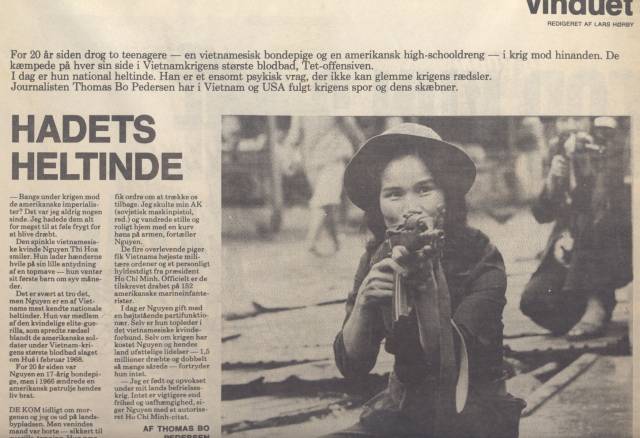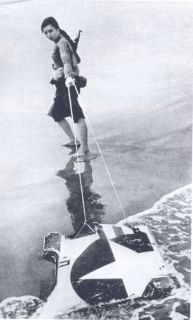|
Propaganda poster for the 30th Anniversary of 'The Complete Liberation of the South'.
WOMEN AT WAR
In the past 2000 years of Viet Nam's history the Vietnamese women have been lauded for their role in war - starting with Hai Ba Trung (the two sisters Trung) who led the rebellion against Chinese suppression. After some spectacular victories the two sisters suffered a decisive defeat, and according to legend drowned themselves in shame. Most major Vietnamese cities still have a main street called Hai Ba Trung.
A rare photo of Nguyen Thi Minh Khai with Lenin's wife Krupskaya in Moscow during a Communist congress in 1935.
Minh Khai was executed by a French firing squad 28 August 1941.
The role of women in the Viet Nam wars of the 20th century was one of the main features of Vietnamese propaganda as well as in numerous books from the 'other side' - i.e. French and American combat memoirs and war time press reports.
The most famous of them was Nguyen Thi Minh Khai, a veteran revolutionary from Nghe An, Ho Chi Minh's home province. She was one of the main organizers of the revolts against the French in the South and was Communist Party Secretary in Sai Gon, when French agents caught her in 1940. According to the legend Minh Khai wrote a farewell poem on the prison wall with her own blood, before she was executed 28 August 1948.
During a reporting trip in 1985 - the 10th Anniversary of the end of the war - I set out to meet some of these women warriors, mythological figures, even when still alive.
It proved to become a trip through the most incredible stories of personal suffering and courage. One of them was an old woman of Da Nang who still had a tough time coping with her sense of guilt. She had hidden a powerful bomb in a pineapple for her 12 year old son to deliver to the US troops at the huge military base at the airport.
Something went wrong, and her son blew up along with a handful of soldiers. Still, she kept on producing her explosive devices for years, until the war came to an end. Her photo, with the saddest eyes I have ever seen, is still on display in the "Heroine Mothers Room" in Bao Tang Quan Doi Nhan Dan - the Army Museum in Ha Noi along with dozens of other photos of women, who lost all or most of their family members during three decades of war.
They are evidence of the brutal truth that Ho Chi Minh offered to a French officer in 1946, after the negotiations had broken down for a peaceful end to French colonialism in Viet Nam:
"You may kill ten Vietnamese for every French soldier, we kill - but you will lose, and we will win."
Ho Chi Minh and movie director Stanley Kubrick have one thing in common. Both of them immortalized a group of women guerrillas in the old imperial city of Hue. Uncle Ho wrote a poem about them, and in his film Full Metal Jacket Stanley Kubrick demonstrated how frightening and deadly the encounter with the women fighters became for the American troops that were sent in to recapture Hue during the Tet Offensive in 1968.
In Kubrick's drama one of the women stays back on the first floor of a burning building with her AK 47. One by one she takes down an advancing team of Marines - until she is finally killed.

Nguyen Thi Hoa and another surviving guerrilla re-enacted
their part in the Tet offensive for us.
In real life four of the twelve women in the group survived the Tet Offensive and the war. The woman guerilla group had harassed the American troops for months, and 8 of them were killed in the final showdown. One of the two was credited with the killing of dozens of GI's with piano string strangling - it was hard to believe, when I met Nguyen Thi Hoa - a shy, minute woman, now pregnant with her second child, on a cool and beautiful spring morning in 1985 in the imperial citadel, where the worst of the fighting had taken place.
Responding to the rather naive question, where she found the courage to engage in battle with GI's twice her size, she simply stated:
"I hated them too much to be scared. I was only16, when I watched them kill my older sister."
It was an early morning in 1966 in Hoa's home village in Quang Tri province - just south of the 17 parallell which divided Viet Nam into two.
"The soldiers herded us together outside our houses. Only women and children were here. All the men were hiding at the jungle base or fighting the Americans somewhere. They interrogated my sister and beat her violently, even though she was very pregnant. When she refused to talk, they killed her."
Hoa joined the guerrilla units and was selected to become a member of an elite squad, consisting of women only. They were trained to play a key role in The Tet Offensive of 1968, when North Vietnamese troops and Southern guerrillas attacked simultaneously in 104 locations all over South Viet Nam.
"We were a team of 12 women, and our orders were to eliminate a group of American officers in Hué. They all stayed in the same house in the city - quite stupid of them. It proved to be a lot easier than we expected. We were a suicide commando unit, and none of us expected to survive for long. But the Americans panicked, and it was not much trouble killing them.
I wounded one of them, and three of his comrades gathered around to help him. Then I got all four of them with a hand grenade. "

A piece of wreck from a US plane is brought ashore in Nam Dinh province
During the first days of the Tet Offensive the guerrillas captured the old Imperial City, and it took the US Marines and their South Vietnamese allies almost 25 days to recapture Hué. The loss of lives on both sides was horrendous, and more than 3.000 cvilians were killed.
Our government press center officials appreciated the value of good photos for Western reporters. So it took little persuasion to arrange for Hoa and a fellow woman veteran to re-enact the initial attack on the US officers - even vintage AK 47's were brought to the scene. The two ex-guerrillas demonstrated with shy giggles that they had not forgotten their wartime deadly skills, even though Hoa had some trouble throwing herself in kneeling shooting position in her pregnancy.
"Four of my team were still alive, when we received orders to withdraw. I hid my AK and went home with a bunch of chickens in a basket on my arm, looking like a normal farm girl," said Hoa.
The Guerrilla women of Hué were awarded the highest military honors for their role in the Tet Offensive. After the war Hoa married a prominent cadre of the Communist party and became one of the leaders in the Women's Union.
Of course I had to ask her, if she ever had any second thoughts about the war and the enormous sufferings it brought on herself and her people. She simply replied by quoting Ho Chi Minh's most famous saying, as inscribed on the marble tiles right inside the entrance to his mausoleum on Ha Noi's Ba Dinh square: Nothing is more precious than freedom and independence.
Click here to meet US Marine Bob Pope who fought in Hué against the guerrillas during the Tet Offensive.
|